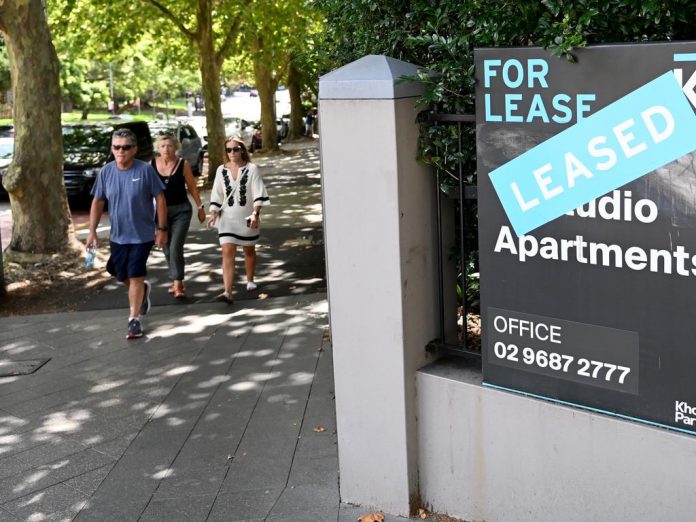[ad_1]
Tenants are paying as much as $350 extra lease per week than this time final 12 months, as our housing disaster reaches breaking level. Image: NCA NewsWire / Jeremy Piper
Tenants are paying as much as $350 extra lease per week than this time final 12 months, as our housing disaster reaches breaking level.
In line with nationwide housing marketing campaign Everyone’s Houses, some Sydneysiders are paying greater than $350 further lease than they have been right now in 2022.
In Brisbane, renters are forking out as a lot as $185 greater than on the identical time final 12 months, whereas in Melbourne, Victorians are paying as a lot as $165 extra per week to lease a roof over their head.
Everyone’s Houses has analysed the worst affected areas for tenants in Sydney, Brisbane and Melbourne, based mostly on the SQM Analysis Weekly Rents Index for mixed models and homes.
They discovered that in Sydney over the previous 12 months, asking rents have elevated between about 28 per cent and nearly 50 per cent. In the meantime, emptiness charges are largely sitting under 2 per cent.
Hassinah Dadyar is a single mum whose lease goes up in Might and fears she’ll be unable to pay. Image: Julian Andrews
MORE: Inside Pup and Jade’s $13m ‘make up love nest’
NRL famous person’s controversial farm on the market
Billionaire local weather change ‘activist’ continues waterfront dwelling purchase up
Over the identical interval, in response to the research, asking rents have elevated between about 11 per cent and 36 per cent in Melbourne whereas emptiness charges throughout the Victorian capital are sitting effectively under 2 per cent.
In Brisbane, asking rents have elevated between about 18 per cent and 37 per cent, with emptiness charges throughout the town sitting at or under 1.1 per cent.
Federal and state governments have been roundly criticised for showing to do little or no about Australia’s lease disaster and Everyone’s Residence spokesperson Maiy Azize stated the implications of presidency inaction will solely worsen.
“Extra Australians are being priced out of getting their primary want for a house,” she stated.
“Many are being pressured to skip meals, keep away from the physician, and take out payday loans simply to pay the lease.
“There’s solely a lot individuals can afford to pay in lease. Proper now, there’s no finish to the housing disaster in sight. Politicians can’t hold leaving it to probability, hoping we’ve reached a tipping level. The unhappy actuality is rents will hold climbing with out authorities motion.
“With rates of interest rising once more this week, renters may very well be confronted with one other enhance and in contrast to landlords, they don’t get tax handouts to assist them keep afloat.”
MORE: Delta Goodrem’s inspirational childhood dwelling on the market
Areas recording 200 per cent development in simply 12 months
“We additionally want the Federal Authorities to make a serious funding in social housing. Australia must construct at the least 25,000 new social houses every year to finish our shortfall.”
In Sydney, among the many areas hardest hit embody Canterbury Bankstown, Parramatta and Western Sydney the place tenants are set to fork out greater than $6,300 further per 12 months in lease on the present asking costs, in response to the analysis from Everyone’s Houses.
In Melbourne, figures present tenants in Internal East Melbourne are set to fork out greater than $8,500 further per 12 months in lease on the present asking worth. Image: NCA NewsWire / Andrew Henshaw
In Melbourne, figures present tenants in Internal East Melbourne are set to fork out greater than $8,500 further per 12 months in lease on the present asking worth, whereas Mornington Peninsula renters might be $4,200 worse off.
Within the Queensland capital, the figures reveal tenants in Internal Brisbane are set to fork out greater than $9,600 further per 12 months in lease on the present asking worth, whereas Ipswich renters might be $4,400 worse off.
MORE: 862 suburbs the place rents are lower than $400
High 10 worst areas for renters in Sydney
Area: Asking lease Feb 23 – 12 month change in weekly lease – Emptiness charge Jan 23
1. Jap Suburbs:$1,073/$351 or 48.6%/1.2%
2. Decrease North Shore/ $1,097/$338 or 44.5%/1.7%
3. Sydney CBD: $1,027/$303 or 41.8%/2.9%
4. Canterbury Bankstown: $603/$167 or 38.3%/0.7%
5. Internal West: $714/$184 or 34.8%/1%
6. St George: $641/$163 or 34%/1.1%
7. Higher North Shore: $848/$209.55 or 32.8%/2%
8. Parramatta: $579.54/$136 or 30.7%/1.1%
9. Northern Seashores: $1,082/$251 or 30.2%/1.3%
9. Sutherland Shire: $744/$172.54 or 30.2%/1%
10. Western Sydney: $565.58/$123 or 27.8%/1.3%
High 10 worst areas for renters in Melbourne
Area: Asking lease Feb 23 – 12 month change in weekly lease – Emptiness charge Jan 23
1. Internal East Melbourne: $622/$165 or 36.2%/1.3%
2. Melbourne Metropolis: $622/$157.51 or 33.9%/1.5%
3. Bayside: $629/$134.59 or 27.2%/1.3%
4. Jap Melbourne: $559/$108 or 23.9%/0.9%
5. Melbourne North: $498/$76 or 18.1%/1.1%
Rental vacancies are at report lows. Image: NCA NewsWire / Jeremy Piper
6. Mornington Peninsula: $539/$82 or 17.9%/0.9%
7. South West Melbourne: $496/$66 or 15.4%/1.5%
8. South East Melbourne: $492/$65 or 15.2%/0.9%
9. Western Melbourne: $448/$55 or 13.9%/1.6%
10: North West Melbourne: $453/$45 or 11.1%/1.3%
High 10 worst areas for renters in Brisbane
1. Internal Brisbane: $685/$185 or 37%/1.1%
2. Brisbane CBD: $672/$156 or 30.3%/1.1%
3. West Brisbane: $588/$116 or 24.6%/0.8%
4. Southern Brisbane: $561/$110 or 24.4%/0.9%
5. East Brisbane: $703/$132 or 23.1%/1%
6. Ipswich: $477/$86 or 21.9%/1.1%
7. Beenleigh Hall: $578/$96 or 20%/0.6%
8. Northern Brisbane: $578/$91 or 18.6%/0.6%
10. South East Brisbane: $656/$101.52 or 18.3%/1%
* Week ending 28 February 2023
* Supply: Everyone’s Residence/SQM Analysis
[ad_2]
Source_link





